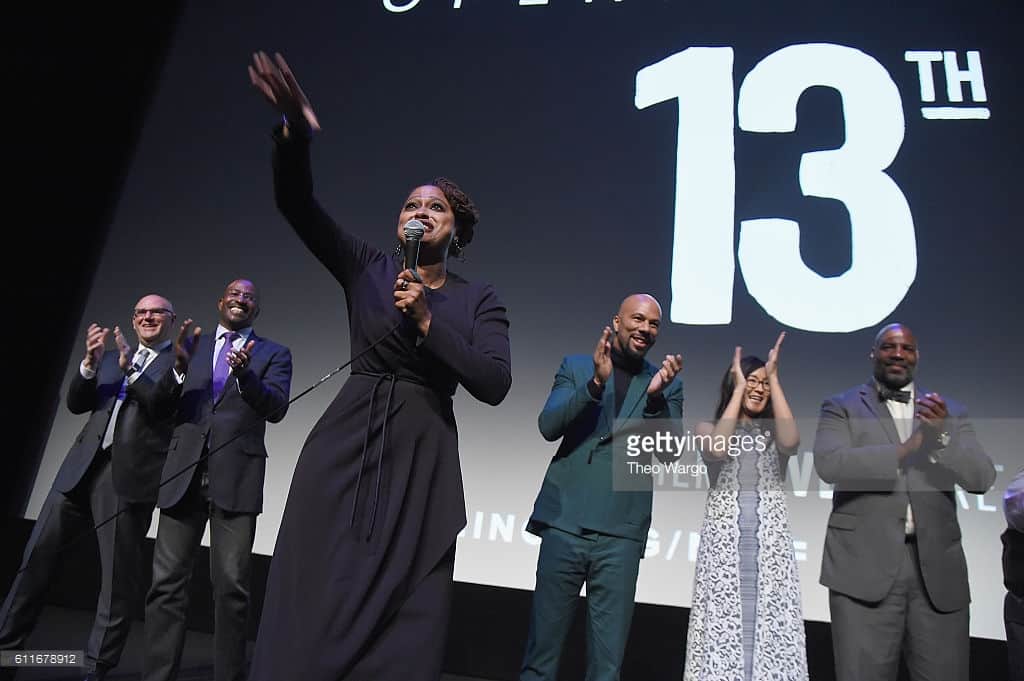We’ve got best-selling books on mass incarceration. We’ve got videos of unarmed people of color getting shot and killed. We’ve even got #blacklivesmatter, which has already appeared over 12 million times on Twitter.
Yet, otherwise smart people are saying things like, “This country isn’t oppressing black people.” 38% of white people say they don’t even understand the goals of the Black Lives Matter movement, to say nothing of whether they actually support it.
People see Philando Castile shot and dying? An isolated incident. Eric Garner? A chokehold gone horribly wrong. Trayvon Martin? Just one crazy vigilante, that’s all.
What will it take for all Americans to become believe that systemic racism in our country is a thing?
We’ve all heard the facts. We know about the rapidly rising incarceration rate in the U.S.:
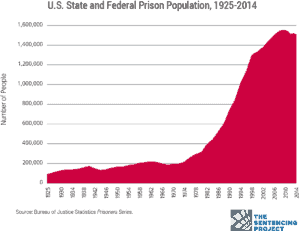
And that the United States has the highest incarceration rate in the world:
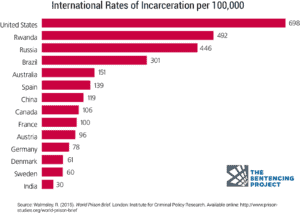
And that most of the increases in incarceration rates have to do with drugs:
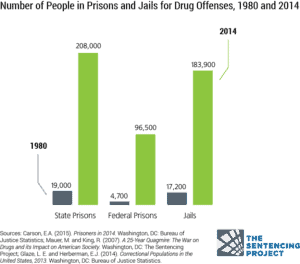
And that these offenders are overwhelmingly likely to be African-American or Latino men:
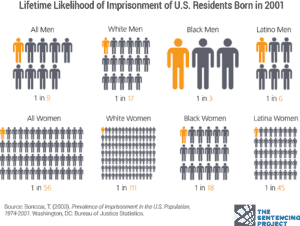
These facts don’t exist in isolation. We take them in as part of a narrative we tell to help us understand the world. We make from them our stories of black folk.
Trayvon Martin’s killer, George Zimmerman’s story to his jury was one of fear. That black men are scary. That seeing the 17-year-old black kid in the hoodie caused him to fear for his life. That it was self-defense.
They bought it.
Others tell another story- that our country’s history is one of racial progress. We have a black president, the story exclaims. Look at how far we’ve come! But that one doesn’t account for these brutal facts about incarceration.
We need a different story.
A better story takes a broader view of the facts. It’s a story that successfully connects current manifestations of systemic racism back to slavery, a practice that we universally condemn. A story that rejects our contention that we would have never tolerated slavery had we been alive back then. A story that reminds us that we are standing idly by while steadily increasing numbers of (mostly) black men are sent to prison for (mostly) non-violent, drug related offenses.
Ava Duvernay offers us exactly this story in her new Netflix documentary, 13TH, which presents these facts in the context of the whole of black history in the United States–chattel slavery through the present day.
The arc of this story is the consistent oppression of black folk. While this oppression used to be overt (slavery and segregation), it is now more subtle and insidious (mass incarceration and violence).
It starts at the beginning. The film takes its name from 13th Amendment to the Constitution, which abolished slavery in the United States. Duvernay directs our attention to the amendment’s one key exception:: “except as a punishment for a crime whereof the party shall have been duly convicted.”
In this story, slavery hasn’t disappeared. It’s just taken a new form: locking people of color in prison.
And this story is not partisan. Of course, it features Nixon’s 1971 “War on Drugs” and its subsequent intensification under the the Reagan’s“Just Say No” campaign.1 But it also continues with Bill Clinton’s signing of the 1994 Crime Bill, which led to the largest increase of incarcerated people in our nation’s history. As Republicans and Democrats fought over votes for being “tough on crime,” people of color paid the price.
In what is certainly 13TH’s most surprising original interview, Newt Gingrich2 puts it simple, “The objective reality is virtually no one who is white understands the challenge of being black in America.” Newt can be so frank, because Duvernay isn’t interested in finding scapegoats or placing blame. All 13TH wants to do is take all of those facts and anecdotes floating around our consciousness and place them in a broader narrative. It wants to help those white folk understand the challenge of being black.
In doing so, 13TH reminds us that we are inheritors of a story of racial injustice with chapters that span over four centuries. 13TH is a must-see because it gives us the tools to tell that story. It’s a story so matter-of-fact that it’s hard to believe we haven’t already heard it. But maybe that’s because we haven’t been listening.
13TH is not rated. Running time: 1 hour 40 minutes. Watch it here.
- Which increased the amount of people imprisoned for non-violent drug offenses from 50,000 in 1980 to over 400,000 by 1987. ↩
- Yes, that Republican, Contract-With-America, Speaker-of-the-House Newt. ↩

